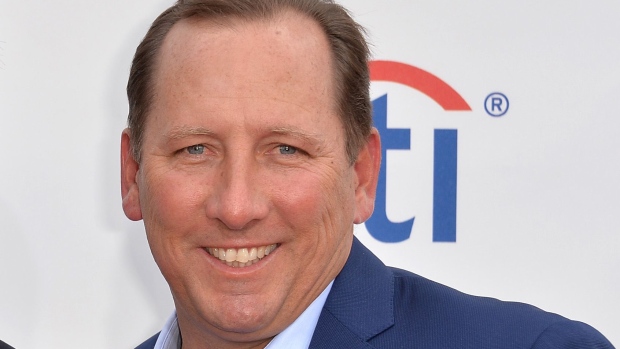(Bloomberg) -- European soccer ownership is today just as likely to be thrashed out at a Miami Beach steakhouse as in the plush restaurants of London, Milan or Paris.
Florida’s sunshine and business-friendly policies have been drawing financiers and entrepreneurs, including a group pouring money into the world’s favorite sport. Among them is John Textor, who’s just completed the purchase of 80% of Belgian club RWD Molenbeek through his sports investment vehicle Eagle Football LLC.
Other soccer-mad investors based in South Florida are Paul Conway and Chien Lee, founders of Pacific Media Group LLC, Josh Wander, managing partner at 777 Partners LLC, and Randy Frankel, co-owner of the Tampa Bay Rays baseball team.
“More and more professional investors have moved to South Florida, and they love football,” Lee said in an interview. “Football is an attractive and good asset class investment.”
Conway, who meets his contacts to discuss the evolution of soccer at Miami Beach spots including celebrity-favorite steak restaurant Prime 112 or nearby Joe’s Stone Crab, also played a part in the RWD Molenbeek deal.
“He’s acted like a friend,” said Jupiter Island resident Textor. “He’s a terrific resource and even flew to Belgium with me to introduce me to the owners of the team.”
Conway, Lee and Textor champion the multiclub ownership model that’s grown in popularity as a way of developing stars of the game without the need for hefty transfer fees. Pacific Media has spent recent years buying stakes in teams across Europe, while Textor is already invested in Crystal Palace FC of the U.K. Premier League.
“Americans are going to be owning more and more of European football,” said Conway. “A lot will go through a multiclub arrangement, where when one club struggles, the others might be able to help them.”
There are about 60 multiclub groups globally, nearly two-thirds of which have emerged since 2018, according to the International Centre for Sports Studies (CIES). Proponents of the strategy point to cost synergies and the potential to strike more lucrative sponsorship deals. Critics, including fans’ body Supporters Direct Europe, say it stifles competition and creates feeder teams with no real prospect of success.
Here’s a closer look at the main U.S. investors buying up European soccer.
John Textor, founder of Eagle Football LLC
Dubbed a “virtual-reality guru” by Forbes Magazine in 2016, Textor is chief executive officer of digital likeness and human animation company Facebank Inc. He shot to prominence in the European soccer world in 2021 by taking a stake in Crystal Palace.
The south London team are slowly carving out a reputation for exciting football under the coaching of Frenchman Patrick Vieira, the former World Cup winner installed last summer, and could now stand to benefit from talent developed at RWD Molenbeek.
“If you want to pursue a multiclub strategy you need to have the global footprint for talent identification from a market respected by the U.K.,” said Textor. “There is a very high level of play in Belgium, which is only two hours outside London.”
Named in part for Crystal Palace’s club emblem, Textor’s Eagle vehicle is also in talks to buy a minority stake in Lisbon, Portugal-based soccer giant SL Benfica, said Textor. Outside Europe, Eagle now holds 90% of Brazil’s Botafogo via a $330 million deal that completed this week, he said.
Paul Conway and Chien Lee, co-founders of Pacific Media Group
Pacific Media’s soccer stable includes stakes in AS Nancy of France, Barnsley FC in the U.K., Denmark’s Esbjerg fB, FC Thun of Switzerland and KV Oostende in Belgium.
A former Oppenheimer & Co. banker, Conway advocates the high-pressing style that’s become popular in Europe’s top leagues. Ensuring a common approach to playing this way means it’s easy to move players around his clubs if and when the need arises.
His teams rely heavily on data analysis when recruiting and developing young talent. Billy Beane, the ex-U.S. baseball player who pioneered a similar model during his time managing California’s Oakland Athletics -- a story later retold in Michael Lewis’s 2003 book “Moneyball” -- sits on Barnsley’s board.
Barnsley qualified for the Championship play-offs last season, taking them to within touching distance of the lucrative Premier League. They were unsuccessful in that attempt and are now in a battle to avoid relegation from the second-tier of English football. Nancy and Oostende have also been struggling, with both in the bottom halves of their respective tables in France and Belgium.
Conway is being patient. “There are highs and lows throughout each season,” he said. “Our goal is to grow a club in a sustainable way, while also being a good custodian for the local community.”
Josh Wander, co-founder of 777 Partners
Wander’s 777 has built a portfolio of sports assets that includes streaming services and investments in British basketball. The firm targets undervalued businesses with deep connections to fan bases, according to its website, and for soccer bets Wander has so far picked two of Europe’s most historic clubs.
In September, 777 acquired ownership of Italy’s oldest soccer team, Genoa Cricket and Football Club, commonly known as Genoa. It already held a minority stake in Sevilla FC, one of Spain’s most successful outfits.
Wander knows Conway and Jim Pallotta, the former owner of Italian soccer club AS Roma, from living in Miami. He said he’s having multiple conversations about buying more soccer teams in Europe and elsewhere.
“Having smart and honest people investing in football globally is good for the leagues,” he said.
Although Ukrainian footballing legend Andriy Shevchenko was appointed coach of Genoa last year, the team has won just one game in the current league campaign and risks being relegated from Serie A at the end of the season.
Randy Frankel, Josh Harris
Miami local Frankel has been dipping into European soccer via investments alongside Conway. Through Partners Path Capital, run by former Tampa Bay Rays executive Michael Kalt, Frankel has been involved in Pacific Media deals including Nancy and Oostende.
“Right now, us and Pacific Media are good partners,” he said. Goldman Sachs Group Inc. alumnus Frankel, who has “no shortage” of people wanting to team up for more European soccer deals, also likes the multiclub model, which he said lets an investor learn things from different countries and their peoples.
Josh Harris, a co-founder of private equity giant Apollo Global Management Inc., bought a $32 million Miami mansion last year. Like Textor, he sits on the board at Crystal Palace. Harris called time on three decades at Apollo in 2021 after missing out on the top job at the firm. He is co-founder of Harris Blitzer Sports & Entertainment, which he runs with Blackstone Inc. dealmaker David Blitzer.
©2022 Bloomberg L.P.













